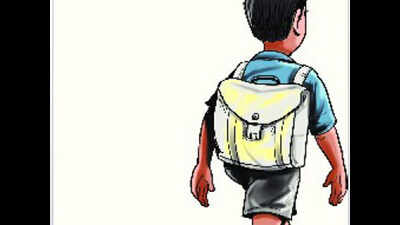- News
- City News
- mumbai News
- Gujarati, Marathi teachers to shift to English civic schools
Trending
This story is from May 5, 2018
Gujarati, Marathi teachers to shift to English civic schools
Activists Angry, Say That Move Will Affect Quality Of Education

Representative image
MUMBAI: Starting this academic year, students at some English-medium civic schools will be taught by teachers from Marathi and Gujarati schools. Parents and activists are stumped by the BMC's move and wonder how it will impact the quality of education at civic schools. The civic body has justified the decision saying Marathi and Gujarati teachers would be given a month's training before being absorbed in English-medium schools.
The decision has been taken in an attempt to accommodate surplus teachers at Marathi and Gujarati schools, which have seen a drop in number of students over the years. "On the other hand, English-medium schools have seen an increase in number of students and hence, they are understaffed," said Prakash Charate, deputy education officer, BMC.
The BMC's education department has called interested teachers to undergo the month-long training programme that aims to strengthen their English-speaking skills. On completion of the programme, the teachers will be absorbed in civic-run English medium schools for classes I to V.
"Some of these teachers have been already teaching at English medium schools as there has been a severe shortage. We will be training them now," added Charate.
The teachers will be tested every Saturday during the programme and a final test will decide if they are selected for a position in the English medium. They will be trained by professionals from
"Many teachers from vernacular medium have already trained themselves in English in the past. Now, they will be skilled to deliver all topics in English. Basically, their spoken English and communication skills will be developed," he said. After the training is over, refresher courses will be held for them two days of every month.
However, activists have raised questions. "Surplus teachers are being accommodated at the cost of the quality of education being provided to children. The students are the ones who will be at a loss. One cannot teach in English after undergoing just a month-long training programme or even a few refresher courses," said Jayant Jain, president, Forum for Fairness in Education, an NGO.
Nitin Wadhwani, Citizens Association for Child Rights, a group that works with students in civic schools, said, "Teachers from vernacular medium have taken English training in the past too but we are unsure how effective that has been."
The decision has been taken in an attempt to accommodate surplus teachers at Marathi and Gujarati schools, which have seen a drop in number of students over the years. "On the other hand, English-medium schools have seen an increase in number of students and hence, they are understaffed," said Prakash Charate, deputy education officer, BMC.
TimesView
It is hard to see how such a step can be implemented without diluting the quality of education. It is nobody's case that those who have taught in Marathi or Gujarati schools cannot teach in an English-medium civic school or cannot attain proficiency in a new language. But a month-long course and intermittent intensive training will simply not be enough. The move is going to end up being unfair to both the teachers and their students and will further dent the image of BMC schools.
The BMC's education department has called interested teachers to undergo the month-long training programme that aims to strengthen their English-speaking skills. On completion of the programme, the teachers will be absorbed in civic-run English medium schools for classes I to V.
The training will take place from May 7 to June 7, and nearly 80 teachers are expected to participate.
"Some of these teachers have been already teaching at English medium schools as there has been a severe shortage. We will be training them now," added Charate.
The teachers will be tested every Saturday during the programme and a final test will decide if they are selected for a position in the English medium. They will be trained by professionals from
British Council and subject experts.
"Many teachers from vernacular medium have already trained themselves in English in the past. Now, they will be skilled to deliver all topics in English. Basically, their spoken English and communication skills will be developed," he said. After the training is over, refresher courses will be held for them two days of every month.
However, activists have raised questions. "Surplus teachers are being accommodated at the cost of the quality of education being provided to children. The students are the ones who will be at a loss. One cannot teach in English after undergoing just a month-long training programme or even a few refresher courses," said Jayant Jain, president, Forum for Fairness in Education, an NGO.
Nitin Wadhwani, Citizens Association for Child Rights, a group that works with students in civic schools, said, "Teachers from vernacular medium have taken English training in the past too but we are unsure how effective that has been."
End of Article
FOLLOW US ON SOCIAL MEDIA










